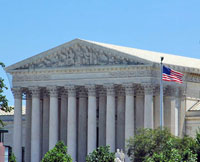First Amendment fights to dominate high court
 There are some important First Amendment cases coming before the U.S. Supreme Court in the session that begins today. Cases will test the separation of church and state, whether anti-gay protesters can violate a private funeral service with their messages, and maybe whether anti-gay groups can hide their funding from public view.
There are some important First Amendment cases coming before the U.S. Supreme Court in the session that begins today. Cases will test the separation of church and state, whether anti-gay protesters can violate a private funeral service with their messages, and maybe whether anti-gay groups can hide their funding from public view.
The most important case for the LGBT community at the moment is Snyder v. Phelps, which the court will hear on Wednesday, October 6.
The family of Matthew Snyder, a Marine killed in Iraq, has appealed a decision from the conservative 4th Circuit U.S. Court of Appeals. The appeals court said that the anti-gay messages of Kansas activist Fred Phelps and his “Westboro Baptist Church” are protected by the First Amendment guarantee of freedom of expression—even when that expression targets a private funeral service.
Phelps’ group is well known to the LGBT community for its many appearances at gay pride events around the country, holding up enormous signs saying “God Hates Fags.” The group began showing up at soldiers’ funerals starting with the Iraq war. Matthew Snyder was never identified as gay, nor were any of the other soldiers at whose funerals Phelps has protested. Phelps said the protests were prompted by the military’s “Don’t Ask, Don’t Tell” law. Most LGBT people see the DADT law as a ban on gay servicemembers; Phelps sees it as tolerating gays in the military.
Attorneys for the Snyder family argue that the anti-gay and hateful expressions inflicted emotional distress and intruded on their privacy. A jury agreed at the district court level, and the lower court ordered the Phelps’ clan to pay the Snyders $5 million in damages. The 4th Circuit disagreed, but at least four justices at the U.S. Supreme Court believed the high court should review that decision.
Long-time Supreme Court reporter Lyle Denniston captured the complexity of the case when he wrote that the First Amendment question on the table is “the degree of constitutional protection given to remarks that a private person made about another private person, occurring outside the site of a private event.”
Specifically, Phelps and his group held up signs near the funeral site saying “God Hates Fags,” “Semper Fi fags,” and “God Hates the USA.” They posted similar messages on their website.
This is one place where partisan warfare in Washington has ceased. Senate Democratic Majority Leader Harry Reid and Minority Leader Mitch McConnell and 40 other senators submitted a brief on behalf of the Snyders. Both the right-wing Liberty Council and the liberal ACLU filed briefs on behalf of the Phelps’ First Amendment rights.
An October 1 article in the American Bar Association’s ABAJournal quotes Phelps as euphoric over all the publicity the October 6 oral arguments will bring to his group. He also sees his hatred of gays as a “sincerely held religious belief.”
Phelps’ group will be represented in court Wednesday by Phelps’ daughter Margie, who is an attorney.
One case the high court may agree to hear is also of interest: Leslie Weise v. Michael Casper asks whether the First Amendment prohibits government officials who are speaking at government-sponsored public forums on private property can exclude the audience people who disagree with them.
The case arises out of a town hall appearance by President George W. Bush in Denver in 2005 at an event open to the public. Leslie Weise, Alex Young, and a friend obtained tickets to the event through their member of Congress, but they were ejected by event volunteers at the direction of three members of a White House advance team. The advance team reportedly noticed that the three arrived in a car with a bumper sticker that stated “No More Blood for Oil.”
The 10th Circuit U.S. Court of Appeals ruled that the three citizens could be excluded from the event. It relied on a 1995 ruling in a case—Hurley v. Irish-American Gay—in which the Supreme Court said organizers of a private St. Patrick’s Day parade in Boston could exclude a contingent of Irish gays.


Leave a Reply